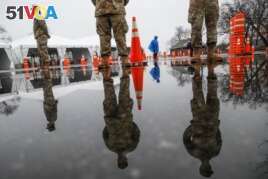13 March 2020
American President Donald Trump declared a national emergency Friday to provide more resources to fight the new coronavirus outbreak.
Speaking from the White House, Trump said, "I am officially declaring a national emergency." He said the action would release up to $50 billion for state and local governments to deal with the outbreak.
The president said he was also giving Health and Human Services Secretary Alex Azar emergency power to ease federal regulations and laws to give doctors and hospitals "flexibility" in treating patients.

National Guard personnel stand at attention as they wait for patients to arrive for COVID-19 coronavirus testing facility at Glen Island Park, in New Rochelle, N.Y.
Trump spoke as his administration is talking with Congress about providing support for people and businesses affected by the outbreak. Before Trump's declaration, Nancy Pelosi, the Democratic speaker of the House of Representatives said the lower house would approve its own coronavirus proposal. She called on Trump and the Republican-controlled Senate to "put families first" by supporting the proposal.
The House bill includes free testing for the virus, guaranteed sick pay for workers who cannot work, money for the unemployed and food programs for children, families and older people.
The virus has changed the daily lives of many Americans. Sporting events have been canceled. Schools have been closed and people in some areas have been asked to limit their movements.
The Trump administration also said Friday that it would provide $1.3 million to two companies to develop new COVID-19 tests. The new test could detect if a person has the new coronavirus within an hour. The announcement came as the U.S. struggles to provide tests to people who want them.
The coronavirus crisis also has affected people close to Trump and some members of Congress. The president, his daughter Ivanka, Attorney General William Barr and several lawmakers are among those who have been near people who have been found to be infected with the new coronavirus.
When asked by reporters if he would be tested for the virus, Trump said he would "most likely" get tested.
Emergency in Europe
In Europe, Spanish Prime Minister Pedro Sánchez said his government will declare a two-week state of emergency on Saturday. He said, "It's an emergency that affects the life and health of all."
The Associated Press reported Friday that Spain had more than 4,200 confirmed cases of the virus. It also said that 120 people had died of the COVID-19 disease. The prime minister warned that the country could have over 10,000 infected persons by next week.
On Friday, Spain blocked the movement of 60,000 people in four towns. A state of emergency permits the government to limit personal movement and to take control of industries and hospitals across the nation.
In Italy, officials admitted that restrictions have not contained the spread of the virus. This week, officials threatened heavy fines and even prison for anyone breaking the nation-wide quarantine.
Three weeks after Italy identified its first case of infection in the north, the country now has a total of 17,600 confirmed cases, with 1,266 deaths.
World Health Organization Director-General Tedros Adhanom Ghebreyesus said, "Europe has now become the epicenter of the pandemic with more reported cases and deaths than the rest of the world combined, apart from China."
I'm Jill Robbins.
Hai Do adapted this story from Associated Press reports. Mario Ritter, Jr. was the editor.
_______________________________________________________________
Words in This Story
regulation –n. an official rule or law that states how something should be done
flexibility –n. the willingness or ability to change or try something new
detect –v. to discover or find something that is being looked for
quarantine –n. a situation in which a person or people are kept away from other to prevent a disease from spreading
epicenter –n. the place on the Earth's surface that is where something begins, like an earthquake or a disease outbreak